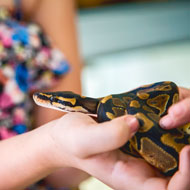
Local venues warned to be vigilant
Basildon Borough Council has won praise for taking a proactive stance on illegal animal trading.
In July this year, Animal Protection Agency (APA) investigators filmed ‘widespread unlawful animal trading’ at a reptile market in Basildon. The event had been described by organisers as a ‘breeders meeting’ at which no commercial animal selling would occur.
Before the event, Basildon Council liaised closely with the APA and the venue to investigate illegal trading. The venue also worked hard to ensure the event complied with legislation and even barred some people from attending.
The APA has commended Basildon Council for examining evidence closely, giving clear and timely advice to the venue, and supporting calls for local venue managers to be cautious about accepting bookings for exotic pet markets.
Furthermore, APA has described action taken by Basildon Council as an example of ‘best practice’ that other councils should follow if faced with similar challenges.
“By continuing to work alongside local councils and venues, we are determined to see an end to animals being sold in such shockingly poor conditions,” says Elaine Toland, director of the APA.
“Footage obtained by our investigators shows lizards, tortoises and snakes barely able to move in small plastic boxes with little to no temperature or humidity control. According to our research, most reptiles die within just one year in the home – sadly reptiles sold at markets are likely to die even sooner from the considerable additional stress they endure.”
It is against the law to trade in pet animals at market stalls as the welfare of animals cannot be safeguarded in such temporary conditions.
With the help of the APA, exotic pet markets have, on the whole, been stamped out by local councils across the UK. However, reptile market organisers often describe their events as ‘shows’ or breeders meetings.



 The latest
The latest